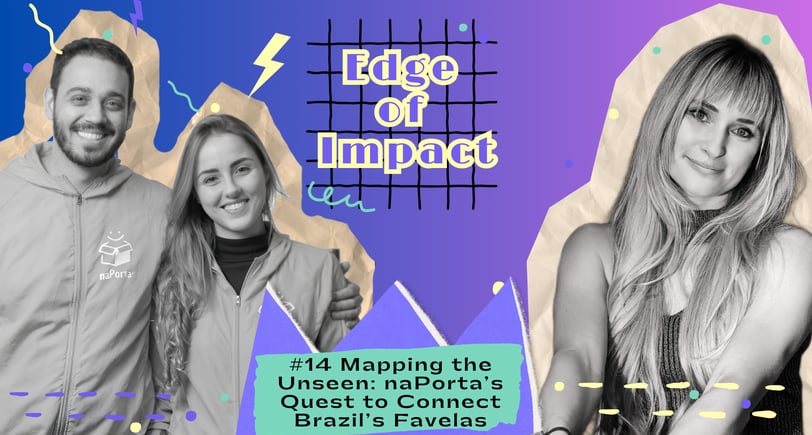#14 Mapping the Unseen: naPorta’s Quest to Connect Brazil’s Favelas
Discover how naPorta, a Brazilian startup, is transforming favelas by delivering e-commerce to areas overlooked by traditional logistics. Founded by a team driven by purpose, they’re breaking stereotypes, delivering packages in just two days vs. weeks, and empowering communities with jobs paying 150% above the minimum wage. With over 220 billion reais spent in favelas in 2021, naPorta is tapping into a vibrant economy while creating lasting social impact. Tune in to hear their inspiring journey of mapping the unseen and transforming lives.
PODCAST
Odeta Ise
5/29/20255 min read


Let's dive into the Insight, Inspiration & Impact behind naPorta with Katrine Scomparin, Leonardo Medeiros
Follow & Support naPorta
WSA Winning Year: 2024
Award: The World Summit Award
Category: Business & Commerce
Founders: Katrine Scomparin, Sanderson Pajeú, Leonardo Medeiros, Rodrigo Yanez
Country: Brazil
On WSA website: https://wsa-global.org/winner/naporta/
In the vibrant chaos of Brazil’s favelas, where millions live with limited access to basic services, a spark of inspiration ignited a transformative venture. On the Edge of Impact podcast, Katrine Scomparin and Leonardo Medeiros, co-founders of naPorta, shared the story of their impact driven log tech startup, born from personal frustrations and a deep desire to create meaningful change. Their journey from corporate disillusionment to building a purpose-led company offers profound insights into how resilience, community trust, and a commitment to equality can reshape lives and economies.
A Seed of Inspiration: From Personal Struggles to Collective Purpose
The story of naPorta begins with its CEO, Sanderson, who grew up in a community where online shopping was a distant dream. Restricted areas like his were often excluded from e-commerce deliveries due to logistical challenges and safety concerns. This personal pain point became the foundation for naPorta’s mission: to deliver everything to everyone, especially in underserved favelas. Leonardo, a former sales manager at AB InBev, brought his own experience navigating these communities. Tasked with ensuring beer deliveries to favelas despite frequent truck thefts, he devised a solution using local distributors who could move freely without risk. This early innovation in last-mile logistics planted the seeds for naPorta’s model.
Katrine, who met Leonardo while working at Amazon, joined the venture during a pivotal moment. Frustrated by Amazon’s inability to deliver to favelas during the pandemic, which blocked Sanderson’s seller account, she saw an opportunity to address systemic gaps. When Sanderson invited her to join his startup through the Founder Institute accelerator, Katrine’s marketing expertise and shared disillusionment with corporate life fueled her decision. Together with Sanderson and CFO Rodrigo da Silva, they pivoted from an initial food commerce idea to a logistics solution for favelas, driven by a purpose to empower communities. As Leonardo reflected, “We wanted to make something with purpose to combine impact with money and innovation.”
Their tagline, “The process harms, but the purpose heals,” encapsulates their resilience. Inspired by a family member’s health struggles and the setbacks they faced as entrepreneurs, this mantra became their anchor, reminding them to prioritise impact over ease. This commitment to purpose over profit distinguishes naPorta, guiding every decision from hiring to scaling.
Insight from the Ground: Understanding Favelas as Economic Powerhouses
naPorta’s success stems from a critical insight: favelas are not just places of poverty but vibrant economic hubs. Contrary to media portrayals of violence and misery, Katrine and Leonardo emphasise that less than 5% of favela residents are involved in crime. The majority are hardworking individuals, often single mothers or small business owners, contributing to a 220 billion reais economy in 2021. Yet, these communities remain overlooked by governments and corporations, lacking basic infrastructure like reliable zip codes, electricity billing, or internet access.
naPorta’s model leverages local knowledge to bridge this gap. By hiring couriers from favelas, who navigate these areas with ease and trust, naPorta ensures deliveries reach doorsteps in as little as two days compared to weeks or no delivery at all before. Their digital zip code solution, developed with Google’s support, further enhances logistics efficiency while addressing broader issues like enabling electricity billing or land tax documentation. As Katrine noted, residents want to “be formal” and pay for services like electricity, but systemic barriers prevent it. naPorta’s technology empowers them to participate fully in society, turning invisibility into opportunity.
This insight into favelas’ economic potential and residents’ desire for inclusion drives naPorta’s impact. By treating customers as equals, paying couriers 150% above Brazil’s minimum wage, and offering education through partnerships with institutions like SEBRAE, naPorta is breaking cycles of informality and poverty. Their work challenges stereotypes, showing that favelas are communities of resilience and ambition, ready to thrive with the right support.
Impact Through Values: Building Trust and Equality
naPorta’s values, transparency, mutual help, celebrating achievements, embracing differences, and owning results, shape its culture and operations. These principles are not just buzzwords but lived practices that foster trust in communities wary of exploitation. Initially met with skepticism as “playboys” from outside the favelas, the naPorta team earned credibility through genuine care. As Leonardo shared, “We treat them with the humanity that no one outside favelas has ever treated.” By staying hands-on, sweating alongside their team, and prioritising impact over profit, they dismantled barriers of distrust.
Their commitment to equality is evident in their workforce: 50% women, many from favelas, and former couriers promoted to leadership roles. They professionalize couriers, offering courses beyond delivery skills, from math to law, through partnerships with educational institutions. This holistic approach transforms lives, enabling couriers to become micro-entrepreneurs who manage their own delivery hubs. One such entrepreneur now employs 11 couriers, generating 1 million reais in revenue, a testament to naPorta’s ripple effect.
Transparency and open dialogue create a safe space for employees to share personal struggles, fostering a family-like environment. Katrine recounted a story of a cleaning lady turned leader who faced resistance from male couriers. When an intern refused to help her, citing their own workload, the team intervened, reinforcing their value of mutual support: “You’re not stupid if you ask for help, it’s about the purpose.” This culture of care ensures naPorta’s impact extends beyond logistics to personal growth and community empowerment.
Challenges and Aspirations: Scaling with Purpose
Despite their impressive growth, from 1,000 deliveries a day in 2021 to 15,000–20,000 today, with 1.4 million reais in monthly revenue, naPorta faces challenges. Professionalizing new couriers, many without formal education or stable family structures, requires significant time and emotional investment. Scaling to more favelas demands cash flow, complicated by 90-day payment terms from clients like Amazon and Shopee, while naPorta pays couriers biweekly. Negotiating fair pricing with B2B clients, who often undervalue their unique service, remains a hurdle.
Yet, their vision is bold. In 2025, naPorta aims to reach 3–4 million deliveries annually, expand to new cities, and deepen government partnerships to scale their digital zip code solution. They aspire to serve not just favelas but other underserved areas in Brazil and beyond, where zip codes and access are lacking. As Katrine urged, “If you see an opportunity in your country, talk to us, let’s make business.”
A Call to Action: Join the Purpose-Driven Movement
naPorta’s journey from inspiration to insight to impact offers a powerful lesson for entrepreneurs and change makers. By holding fast to purpose, embracing community realities, and building a culture of equality, they’ve turned logistical challenges into opportunities for transformation. Their story reminds us that impact starts with seeing the unseen, whether it’s a favela resident yearning for a package or a courier dreaming of a better future.








